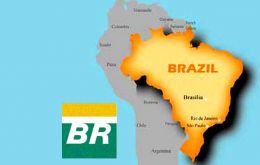MercoPress. South Atlantic News Agency
Economy
-
Thursday, October 3rd 2013 - 06:35 UTC
‘Exasperated’ Obama warns Wall Street that Republicans could force the US to default on its debt

US President Barack Obama has warned that Wall Street should be concerned that a conservative faction of Republicans is willing to allow the country to default on its debt. The US government has partially closed after Congress failed to agree a budget and will run out of cash on 17 October unless its debt ceiling is raised.
-
Thursday, October 3rd 2013 - 06:31 UTC
Colombia, Chile and Peru move to integrate foreign exchange markets

Colombia, Peru and Chile announced on Wednesday the integration of their foreign exchange markets in the framework of MILA to facilitate money exchange operations between the three associates which add to a daily average turnover of 2,798bn. So far the Latinamerican Integrated Market, MILA, is operating with a combined stock market for the three nations.
-
Wednesday, October 2nd 2013 - 22:51 UTC
Brazil oil and gas output reached an average of 2.495 million boepd during August

Brazil's oil and natural gas output rose for the second time in three months in August as new output from giant offshore fields barely outpaced declines from the depletion of older areas and maintenance, oil industry watchdog ANP said this week.
-
Wednesday, October 2nd 2013 - 16:11 UTC
Petrobras readies 60th anniversary announcing a million barrels production increase by next year

Brazil’s state oil company Petrobras, which will mark its 60th anniversary on Thursday, has announced it will increase production by 50% in an effort to overcome the current situation. Nine production units now being installed will pump an additional one million barrels a day beginning next year said Petrobras CEO María das Graças Foster.
-
Wednesday, October 2nd 2013 - 08:20 UTC
Irreconcilable positions forecast US government shutdown could turn really serious

The partial shutdown of the US government showed no signs of ending quickly, as lawmakers stiffened their positions and sought to shift blame to the other side.
-
Wednesday, October 2nd 2013 - 07:54 UTC
Brazil central bank admits “a lot of work must be done” to bring down inflation

Inflation in Brazil will remain stubbornly high well into 2015 even as the economy struggles to gain steam, the central bank said in its quarterly inflation report. The bank also revised down its estimate for economic growth to 2.5% for this year from a previous 2.7% forecast. The bank sees growth keeping that pace until the second quarter of 2014.
-
Wednesday, October 2nd 2013 - 07:51 UTC
Brazil posts first August primary budget deficit in over ten years

Brazil posted its first primary budget deficit for the month of August in more than a decade, central bank data showed on Monday, pointing to a deterioration in the country's finances that is worrying investors and rating agencies.
-
Wednesday, October 2nd 2013 - 07:43 UTC
Dollar drought forces Argentina to extend whitewash law until December 31

Argentina’s President Cristina Fernández has decided to extend the deadline of the whitewash law until the end of December. The recently passed project expired on Monday with 341.5 million dollars entering the country.
-
Tuesday, October 1st 2013 - 20:40 UTC
Argentina’s squid fisheries policy “inconsistent and unsustainable” says expert

Argentina’s latest government’s decisions on squid fishing show that the country’s fisheries policy is “inconsistent and unsustainable,” according to the president of Assistance Food Argentina SA and director of Assistance Food America Inc., Dr. Cesar Augusto Lerena.
-
Tuesday, October 1st 2013 - 18:32 UTC
US Supreme Court possible action on Argentina/hedge funds case deferred a week

The US Supreme Court on Tuesday took no action on a landmark case pitting Argentina against creditors which could have deep repercussions for financially troubled governments and their creditors. The court had been expected to announce whether it would review the case, but it was not included in a list of cases accepted or denied for review that was released on Tuesday.
